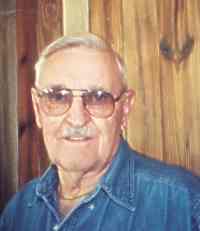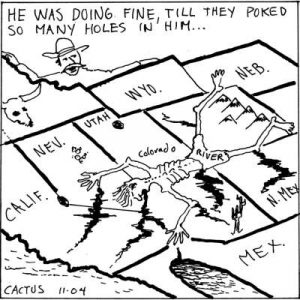Brief by Ed Quillen
Local News – November 2004 – Colorado Central Magazine
Cold Case File
The remains of a Boulder man who had been missing for nearly two years were discovered in Lake County in late September near the top of Independence Pass. The bones were near his car, which had rolled so far off the road that no one had noticed it since he went missing on Sept. 26, 2004.
The victim was identified as Terry Johnson, 48, through dental records. His jawbone was found by a Granby man who had stopped atop the pass to watch elk, then noticed a wrecked car downhill that had likely rolled off the pass.
Sheriff Ed Holte said Johnson had likely been driving at least 50 mph on a 10-mph curve when it rolled 628 feet down the embankment. One mystery remains; according to his girlfriend, Johnson had been on his way to Morrison from Boulder on the day of the accident, so why did he take a 120-mile detour to Independence Pass?
Remembering 125
If you want a special postmark commemorating Buena Vista’s 125th anniversary this year, you’d better hurry — the offer runs out at the end of October. To get the cachet cover, you can stop by the Chamber office there, or send a self-addressed stamped envelope and $2 to the BV Chamber of Commerce, P.O. Box 2021, Buena Vista CO 81211.
Leadville and Alamosa celebrated their 125th birthdays in 2003, and Buena Vista has had a busy year celebrating its quarquicentennial in 2004. Salida turns 125 next year, but so far, we haven’t heard about any plans for a celebration.
Best in the True West
Salida got to be an Outside “Cool Town” last summer, and now Leadville’s getting some national-magazine recognition. In a survey, readers of True West named Leadville the “Best Wild West Town” and “Best Western Historical Site” for 2004. Chamber director Ron Holiday said it was “an indication that more people are starting to find out what the best-kept secret in the United States is.”
Water Updates
The Union Park Reservoir (a.k.a. the Central Colorado Project) is back in the news in Gunnison County — where almost everyone opposes it. The idea is to build a big off-stream reservoir near and above Taylor Park Reservoir, and operate it for both pumped-storage hydroelectric generation and for dry-year supplies to Colorado’s major river basins.
The hydropower part of the project received a conditional water right six years ago, and now must demonstrate “due diligence” to the water court to continue those rights. The main proponent, Dave Miller of Palmer Lake, has spent $140,000 on engineering, but that’s a mere fraction of the estimated cost of more than $1 billion — so it may not be enough to impress the water court.
Lake County owns some water and storage rights, and has the chance to purchase some more — it could end up with about 175 acre feet of flowing water and more than 3,000 acre-feet of storage. But how to manage the water?
The Lake County Watershed Advisory Council has presented three options to the county: join the Upper Arkansas Water Conservancy District (now Chaffee, Custer, and Western Frémont counties), expand the Parkville Water District which now serves Leadville, or form a county water enterprise fund to handle augmentation sales and related water management.
If Blue Mesa Reservoir west of Gunnison were a checking account, it would be overdrawn with little hope of attaining a positive balance in the foreseeable future.
Average annual inflow is 710,000 acre-feet, but it was only 422,000 this year — although that’s better than the 156,000 of 2002. It was 200,000 acre-feet short of filling to its capacity of 829,500 acre-feet this summer — the seventh straight year of below-average run-off.
In 2001, an application for the South Park Conjunctive Use Water Project was dismissed by the water court in Park County, but the applicants, led by the City of Aurora, appealed to the Colorado Supreme Court, which heard arguments on Sept. 14.
The idea was to take water from the upper South Platte basin in wet years, store it underground in an aquifer, and tap that during dry years. The judge denied the application, essentially because the computer models could not accurately predict the effects on existing senior water rights.
If you can get to North Fork Reservoir (the 10-mile road leaves U.S. 50 at Maysville, and it can get dicey, especially if there’s snow, past North Fork Falls), you can catch all the fish you want — it’s home to stocked rainbow and hybrid cut-throats.
The Division of Wildlife suspended the fishing limits through Dec. 31 because the reservoir is being drained for repairs. However, some rules still apply — for instance, you can’t use dynamite.
Observations
Regarding the proposed Union Park water project in Gunnison County, “Our instructions were to go for the jugular, to kill this proposal once and for all.”
— John McClow, attorney for the Upper Gunnison River Water Conservancy District, in the Gunnison Country Times, Sept. 23, p. 29
“I thought you might be interested in the following channeling I received from the Brotherhood of Kindred Spirits…. John Kerry has been preparing for this event in world history for a long, long time! He began looking about at his society in early Roman days as a Senator in Rome.”
— HOB in the Crestone Eagle, October 2004, p. 3
“Visitors to Custer County often remark about the seemingly large number of churches here. They’re right. A recent poll, Religion and Public Life in the Mountain West, shows that Custer County has one of the state’s ‘churchiest’ populations … [ranking] eighth statewide … at 69.5 percent.”
— Jim Little in the Wet Mountain Tribune, Sept. 30, 2004, p. 4
Big Forest Trash
Littering in the National Forest is all too common, but most of the trash isn’t much bigger than a pop can. However, the Leadville Ranger District has encountered three abandoned vehicles in the past year.
If the owner can be found, he is asked to remove the car, and fined about $100. If not, the Forest Service removes the vehicle and sells it at a public auction.
Removing a vehicle costs from $500 to $700, according to District Ranger Jim Zornes, who has also found other automotive residue like engine blocks, transmissions, and tires in the forest.
Drug War battles
In Stringtown just south of Leadville, the Lake County Sheriff’s Department confiscated 79 marijuana plants from two houses after getting a tip from an anonymous source which was confirmed by high utility bills.
But in Montrose County, the prosecutor refused to file charges against Michael Branson, who was caught growing 23 plants in his garden after police flew over his rural property. It turned out that he was a registered caregiver under Colorado’s medical marijuana law, and the sheriff’s department should have checked with the state health department before arresting him. “They screwed up,” he said.
No Recovery
The arrest of Park County resident John Gates in 2001 resulted in a criminal trial, at which he was acquitted of resisting arrest, driving under the influence, and criminal mischief. As detailed in the book In the Name of the People (by Peter John Stone, reviewed in the March 2004 edition of this magazine), the jury chose to believe Gates, rather than the arresting deputy, Carl Sharp.
While in custody, Gates suffered a head wound. He said it came from a pistol-whipping; Sharp said it was because Gates had bumped his head in the patrol car.
Gates sued Sharp for $6 million in damages in federal court, charging in a civil complaint that his Fourth Amendment rights were violated by Sharp’s use of excessive force, and that Sharp had lied to make a malicious prosecution of Gates.
After deliberating for three hours on Sept. 21, the jury found in favor of Sharp and the Park County Sheriff’s Office.
Not-so-public Records
Leadville Mayor Bud Elliott decided to protect privacy, or something like that, when he issued an order to the police department to deny public (and media) access to police reports — which are public records by state law.
Once informed of the law, he came to his senses, and when he sought a policy from the City Council, that body responded that the state law was just fine and the city didn’t need a policy.
Police reports should be public for several reasons. One is that the police act in your name and ours, and spend our tax money. Like any employer, we have the right to know what our employees are doing on our time.
Another is that there are countries where you can be arrested and hauled away without anyone’s knowledge. Making police activities public helps prevent us from turning into one of those countries (although, we confess, this argument was stronger before the USA-PATRIOT act was passed in 2001).



